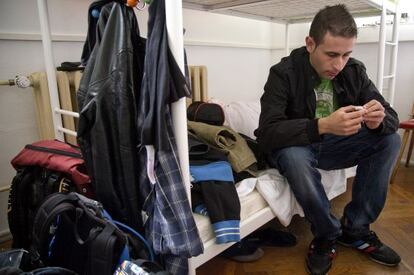128 Spaniards stranded in Germany
Youngsters stuck in city of Erfurt after accepting work-training offer

Sara Alejo, a 20-year-old Spaniard, laughs despite her plight. "It's not as though we're starving to death," she says. However, she does face another month of limbo living in a dilapidated GDR Party School in Erfurt, 300 kilometers south of Berlin.
The site was the first such school opened in the former East Germany, where young members of the Free German Youth were indoctrinated in Marxist-Leninist ideology and organized into Combat Groups "for the defense of our workers' and peasants' realm."
Today, the "workers" are Spanish immigrants seeking to escape the depression at home, and their defense has fallen by the wayside. There is one shower for 21 men and women, who are crowded into the dormitories of creaking bunks, foul-smelling toilets and, above all, a pervading sense of having been duped.
Alejo is one of 128 young Spaniards who traveled to join Germany's celebrated dual system Professional Training program, with the promise of paid work at a local company combined with classes.
But her dream, and that of her compatriots, has been quashed by the ineptitude of intermediary companies in Erfurt and Las Rozas, Madrid.
The manager of the company claims they were “informed in Spain” about what awaited them in Thuringia
Kerstin Schmidt denies any wrongdoing on her part. The manager and only employee of the company that brought the hopefuls to Germany claims they were “informed in Spain” about what awaited them in Thuringia. Schmidt, with evident indignation, says the Spaniards “decided themselves to change course or accommodation” when they arrived in Germany. She says the work contracts are “only for those who maintain the choices they made in Spain.”
The intermediary also claims that most of the arrivals “did not pay their rent.” They were promised individual rooms in shared accommodation. As to their current living conditions, Schmidt retorts: “Many young Germans live like this.”
The German authorities offer monthly benefits and subsidies for air travel for Spaniards under 35 who have a signed and sealed training contract. That is not the case for the Erfurt 128, who paid in advance from their own pockets. The number who remain without contracts, says Schmidt, is impossible to determine but are “exceptions” because they did not meet the language requirements. “I don’t give the classes or information, and I am not responsible for them when they arrive here.” If they come with “misguided expectations,” she says, it is the fault of others. Schmidt receives a commission, direct from the hiring company, for every contract signed.
“I don’t give the classes or information, and I am not responsible for them when they arrive here"
Ángel Goya, from the Spanish embassy, spends his days at the welcome center for immigrants and tourists in Erfurt. He says of the 128, 58 now have contracts and 45 have been promised jobs in the local hostelry sector. They will then be eligible for the state benefits promised by Schmidt and her partner in Spain, Sven Knierenschild, who says he feels like a scapegoat. His company, Sphinx Consulting, organizes the German courses in Madrid before the aspirants leave for Germany. He says he trusted in Schmidt. “The problems started in Germany,” he said at the station in Erfurt, where he was collecting four new arrivals who were to be housed “somewhere better” than the crumbling Communist camp.
The regional government of Castilla-La Mancha also denies any responsibility, although many of the 128 say they heard of the offer at a three-day “informative session” organized by the regional authorities. Knierenschild says he and Schmidt presented their proposal to the regional government.
The German government’s Mediation Center for Foreigners, which administers the state benefits for people on the training program, says it only became aware that the Spaniards were in the country when “it was already a problem.” Thüringer Allgemeine Zeitung printed the story on its front page on Monday, while local authorities speak of “monumental chaos.”
On Friday, the German government is to meet with the 128 to resolve their labor situation and arrange alternative accommodation.
In the meantime Abraham, who signed his contract on Wednesday, hopes to leave Erfurt in a few weeks. Others, such as Abel Donaire, have no idea how long they will have to remain. “This is worse than what people used to say about National Service,” his bunkmate jokes.
A correction has been made to this article - Ángel Goya is from the Spanish embassy, rather than being the Spanish ambassador.
Tu suscripción se está usando en otro dispositivo
¿Quieres añadir otro usuario a tu suscripción?
Si continúas leyendo en este dispositivo, no se podrá leer en el otro.
FlechaTu suscripción se está usando en otro dispositivo y solo puedes acceder a EL PAÍS desde un dispositivo a la vez.
Si quieres compartir tu cuenta, cambia tu suscripción a la modalidad Premium, así podrás añadir otro usuario. Cada uno accederá con su propia cuenta de email, lo que os permitirá personalizar vuestra experiencia en EL PAÍS.
En el caso de no saber quién está usando tu cuenta, te recomendamos cambiar tu contraseña aquí.
Si decides continuar compartiendo tu cuenta, este mensaje se mostrará en tu dispositivo y en el de la otra persona que está usando tu cuenta de forma indefinida, afectando a tu experiencia de lectura. Puedes consultar aquí los términos y condiciones de la suscripción digital.







































